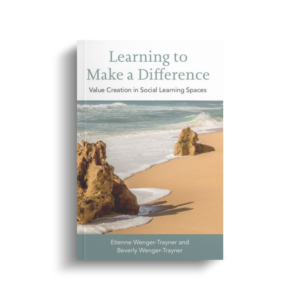Social learning ethic
taking social learning capability to heart
Keywords
Ethic of identity
Learning citizenship
Social learning leadership
Social artist
What it is
Social learning capability is not guaranteed. It depends on people who take steps to nurture it. What we call social learning ethic is the stance and readiness to foster social learning capability however you can and wherever you find yourself.
Social learning ethic is the lived dimension of social learning capability. As a cultural pattern, it can be examined at multiple levels of scale. As a personal experience of participation, it can take different forms:
Learning citizenship. At its most basic, a learning ethic entails acting as a learning citizen: feeling a civic sense of responsibility for contributing to the learning potential of all situations. Learning citizenship might simply be the quality of our engagement in a given learning space. It might lie in the kind of questions we ask in a conversation or the kind of learning connections we make. Sometimes it means stepping up; sometimes taking a low profile. Sometimes it means focusing on one domain to achieve depth; sometimes being a broker moving ideas across boundaries. Sometimes it means committing to be active in an area; and sometimes leaving and moving on. All these acts, from the minute to the major, are acts of learning citizenship. In all cases, a learning ethic entails an overall stance that models the three generators of a social learning space: caring to make a difference, engaging uncertainty, and paying attention.
Social learning leadership. When warranted, learning citizenship may also take the form of more active leadership. You may decide that a social learning space does not exist but should—a missing community, a missing conversation—and take on the responsibility of convening it. Or you may become aware that two groups do not communicate enough and take on the role of systems convener to help bridge the boundary. Regarding the learning partnerships you lead, the kinds of things you pay attention to include: relevance and meaningfulness; being grounded in practice with a view to improving practice; driven by the value learning creates to participants and stakeholders; adjusted in response to what works and what doesn’t; including multiple voices to enrich the partnership with diverse (and often dissenting) perspectives; addressing power issues; distributed leadership among participants. Social learning leadership is often not a role in itself, but an approach you take to a role you find yourself in. When it is a recognized role, it can be as community leader, organizational sponsor, or systems convener.
Social artists. In recognition of the social and personal subtleties of this type of action, we have taken to call “social artist” people who are particularly good at creating the circumstances in which people discover themselves and each other as learning partners and learning citizens.
In itself, learning can be the vehicle of both good and evil. The notion of learning ethic brings an ethical dimension to learning in terms of social learning capability. To understand this as an ethic, it is important to see it as operating at various levels of scale so that this ethical dimension not be hostage to either a local or a global perspective. It is a subtle stance to the world that reflects the social landscape and our position in it. It is anchored in the experience of who we are in the world—in our own locations and in the broader landscape. It translates our identity into source of inspiration and legitimacy for acting as learning citizen. In this deep sense, a learning ethic is an “ethic of identity.”
How it contributes to social learning capability
Social learning ethic is at the heart of social learning capability. How we decide to act as learning citizens or leaders affects the world in small and big ways. It enhances or decreases the learning capability of the social contexts we are part of. Developing a learning ethic is therefore a fundamental condition for developing social learning capability, locally and at scale.
For instance, organizations need to create a learning ethic to increase their learning capability and to foster and spread innovation. One way is to support and cultivate learning citizenship. People in organizations can act as learning citizens when they make decisions that affect the learning capability of their surroundings. Say you are a bridge engineer in a company, and the bridge engineers in your organization are spread all over the world and don’t talk to each other very much. As a worker, you’d say, “I have all this work to do; I don’t have time for anything else.” As a learning citizen, you’d say, “This organization is not maximizing its learning capability. We need to put some energy into making sure we engineers form a community and learn from each other.” We would call doing that an act of “learning citizenship.” That brings a new dimension to the definition of work. But right now, it is something that is not recognized in most organizations. There is not even a language to talk about it. We would say, your most valuable employee is your best learning citizen.
More on social learning ethic
Our exploration of social learning ethic is a more recent development of our inquiry into social learning theory. We are excited about it.
A future book
Social learning ethic will be a central theme of the third volume in our book series on Learning to make a difference. This third volume will focus on the person as a learning agent in the world.
A future workshop
We are planning to host exploratory retreats on the experience of “being” in a social learning space. Among other lines of experiential inquiry, this will include an exploration of social learning ethic at various levels of scale. If you are interested in exploring, let us know:

